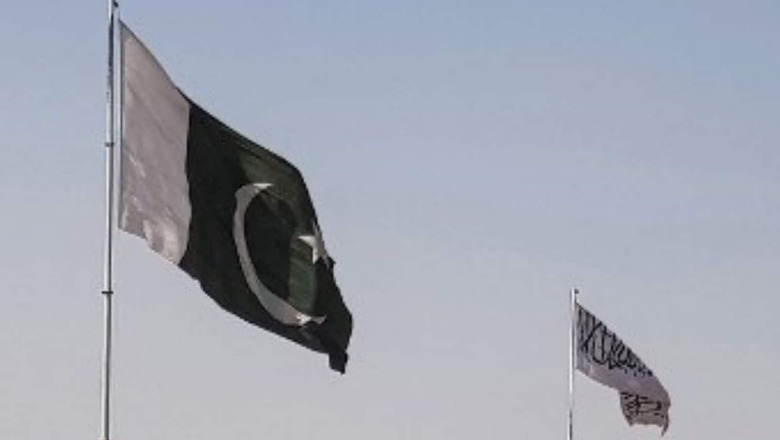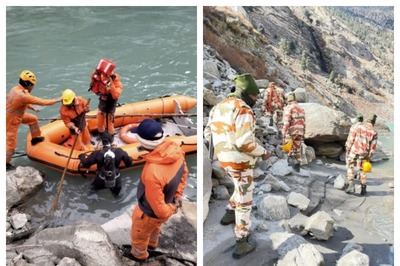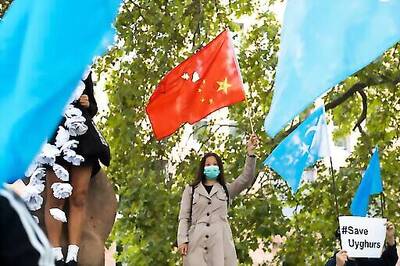
views
Pakistan’s quest to handhold the Taliban after its hostile takeover of Afghanistan last month has set minds racing and tongues wagging. After Pakistan’s Inter-Services Intelligence (ISI) chief Hamid Faiz was spotted in the capital Kabul a few days ago, many have said Pakistan is once again up to its meddlesome ways. While the previous regime routinely accused Pakistan of aiding the Taliban, Islamabad has denied the charge time and again.
China, Russia and India are worried about Pakistan’s aid to the new Taliban government and what it could mean for security and diplomacy in the South Asia region. Over the past few days, each country has stressed that Afghanistan should not become a “breeding ground for terror groups”. Even Australia expressed its concerns during the 2+2 ministerial meeting with India on Saturday. There’s only one catch: Pakistan’s superpower ally, the United States, seems to have missed the memo on Pakistan’s prodding in Taliban affairs.
The Taliban, in a shocking turn of events, has also blamed Pakistan for “tarnishing” the military group’s image. A fresh audio has gone viral indicating a rift between the Taliban and Pakistan over the cabinet positions and Faiz’s interference in the matter.
In the words of C Christine Fair, a professor at Georgetown University’s security studies programme, Pakistan has “spent decades setting fires in South Asia — and then expected praise and remuneration for offering to put them out”. In a hard-hitting article in Foreign Policy, Fair has referred to a tweet by American senator Lindsey Graham that talks about Pakistan being a part of a “sustainable solution” in Afghanistan.
It is then nothing but astonishing that Pakistan is still missing from the list of countries determined by the US Secretary of State to be sponsors of terrorism. According to the website of the US Secretary of State, “a country to have repeatedly provided support for acts of international terrorism are designated”. The website states that currently there are four such designated countries: Cuba, the Democratic People’s Republic of Korea (North Korea), Iran and Syria.
Fair was recently shut down by the BBC when trying to explain Pakistan’s links with the Taliban. A report in The Print states that BBC News drew backlash on Twitter after its presenter, Philippa Thomas, blocked Fair’s comments explaining the links between Pakistan and the Taliban.
Not only Fair, but experts like Husain Haqqani and Rizwan Hussain in their books ‘Pakistan: Between Mosque and Military’ and ‘Pakistan And The Emergence Of Islamic Militancy In Afghanistan’, respectively, have also written about the origins of the relationships between Islamist groups and Pakistan’s military.
According to a 2012 article in Yale Journal of International Affairs titled, ‘The forgotten history of Afghanistan-Pakistan relations’, Pakistan’s “historical and contemporary support for jihadi groups has caused US policy prescriptions to focus prominently on the need to change Pakistan’s strategic orientation”.
Former Pakistani ambassador to US, Haqqani, in his other book ‘Magnificent Delusions: Pakistan, the United States, and an Epic History of Misunderstanding’ has said the relationship between America and Pakistan is based on “mutual incomprehension”. “The countries are not merely at odds. Each believes it can play the other — with sometimes absurd, sometimes tragic, results,” he says.
But the US has pulled up its reckless ally in the past. In 2011, when US-Pakistan relations were rocky, secretary of state Hillary Clinton had told representatives of the Haqqani Network (no relation to former Pakistani ambassador to US Husain Haqqani), “You can’t keep snakes in your backyard and expect them only to bite your neighbours.”
Sirajuddin Haqqani, who headed the Haqqani Network that is a UN-and US-designated terror group, has been appointed to the key post of interior minister in the new Taliban regime as announced on September 7.
Clinton’s words are only a mere example of how the US doles out moderate punishment for Pakistan’s “wrongdoings”. According to reports, the superpower’s reckless ally has not only interfered with the government formation but has also decided to control the Afghan economy by conducting bilateral trade with the Taliban in Pakistani rupees. It has reportedly taken away classified documents of the Afghanistan government for its own use, posing a security threat in the region. Taliban, in many ways, now stands dependent on Pakistan.
It still, however, remains to be seen whether the US, which fought a devastating 20-year war with Afghanistan in the aftermath of the 9/11 terror attacks, is ready to see Pakistan for what it is.
Read all minute-by-minute news updates for Uttar Pradesh election results 2022, Punjab election results 2022, Uttarakhand election results 2022, Manipur election results 2022, and Goa election results 2022.
Click here for seat-wise LIVE result updates.



















Comments
0 comment